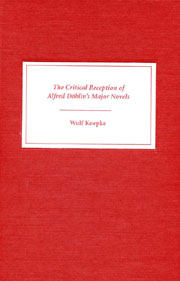Book contents
- Frontmatter
- Contents
- Preface
- Major Novels by Alfred Döblin
- Introduction
- Part One Contemporary Reviews
- Part Two Döblin Scholarship
- 3 Döblin Scholarship: The First Approaches
- 4 Die drei Sprünge des Wang-lun
- 5 Wadzeks Kampf mit der Dampfturbine
- 6 Wallenstein
- 7 Berge Meere und Giganten
- 8 Manas
- 9 Berlin Alexanderplatz
- 10 Babylonische Wandrung
- 11 Pardon wird nicht gegeben
- 12 Amazonas
- 13 November 1918
- 14 Hamlet oder Die lange Nacht nimmt ein Ende
- 15 Döblin's Impact on Other Writers
- Conclusion
- Bibliography
- Index
10 - Babylonische Wandrung
from Part Two - Döblin Scholarship
Published online by Cambridge University Press: 05 February 2013
- Frontmatter
- Contents
- Preface
- Major Novels by Alfred Döblin
- Introduction
- Part One Contemporary Reviews
- Part Two Döblin Scholarship
- 3 Döblin Scholarship: The First Approaches
- 4 Die drei Sprünge des Wang-lun
- 5 Wadzeks Kampf mit der Dampfturbine
- 6 Wallenstein
- 7 Berge Meere und Giganten
- 8 Manas
- 9 Berlin Alexanderplatz
- 10 Babylonische Wandrung
- 11 Pardon wird nicht gegeben
- 12 Amazonas
- 13 November 1918
- 14 Hamlet oder Die lange Nacht nimmt ein Ende
- 15 Döblin's Impact on Other Writers
- Conclusion
- Bibliography
- Index
Summary
IN 1932, ADMIST THE TURMOIL of the disintegrating Weimar Republic, Döblin had started a novel that would take him far afield, the story of a Babylonian god who finds out that he has been deposed, that no one prays to him anymore, and that Babylon has disappeared. The work might have been a tragedy, but it turned out to be a tragicomedy, with many grotesque scenes and characters. The god Marduk, later called Konrad, goes on an unending trip; thus the title Babylonische Wandrung. The larger part of the book was written in exile in 1933 in Zurich and Paris, and it was published in 1934, evoking little response even from the exile community. Döblin scholars tend to avoid this very long text, which does not lend itself to easy definitions and defies both political and religious interpretations.
The most thorough examination of the entire novel was done by Patrick O'Neill in Alfred Döblin's “Babylonische Wandrung”: A Study, published in 1974. O'Neill begins with an introduction to Döblin's life and work, the history of the writing of Babylonische Wandrung in 1932/33 at the very beginning of Döblin's exile, and the novel's publishing history, including Walter Muschg's meritorious but problematic new edition of 1962. After an overview of the stations of the journey, he zeroes in on crucial points. First, the complex of “Babylon,” already familiar to Döblin readers from previous works, especially Berlin Alexanderplatz.
- Type
- Chapter
- Information
- The Critical Reception of Alfred Döblin's Major Novels , pp. 158 - 164Publisher: Boydell & BrewerPrint publication year: 2003

